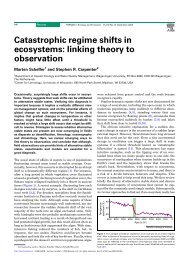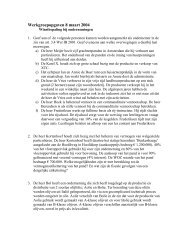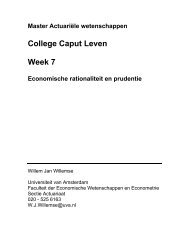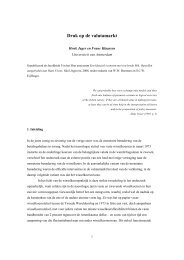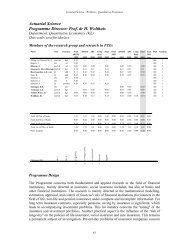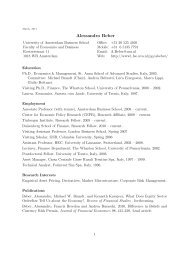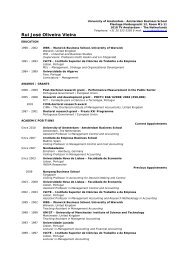A meta-analytically derived nomological network of procrastination
A meta-analytically derived nomological network of procrastination
A meta-analytically derived nomological network of procrastination
You also want an ePaper? Increase the reach of your titles
YUMPU automatically turns print PDFs into web optimized ePapers that Google loves.
1418 W. van Eerde / Personality and Individual Differences 35 (2003) 1401–1418<br />
King, L. A., McKee-Walker, L., & Broyles, S. J. (1996). Creativity and the five-factor model. Journal <strong>of</strong> Research in<br />
Personality, 30, 189–203.<br />
Lay, C. H. (1986). At last, my research article on <strong>procrastination</strong>. Journal <strong>of</strong> Research in Personality, 20, 474–495.<br />
Lay, C. H. (1992). Trait <strong>procrastination</strong> and the perception <strong>of</strong> person-task characteristics. Journal <strong>of</strong> Social Behavior<br />
and Personality, 7, 483–494.<br />
Levine, R. V., & Norenzayan, A. (1999). The pace <strong>of</strong> life in 31 countries. Journal <strong>of</strong> Cross Cultural Psychology, 30, 178–205.<br />
Mann, L., Radford, M., Burnett, P., Ford, S., Bond, M., Leung, K., Nakamura, H., Vaughan, G., & Yang, K. S.<br />
(1998). Cross-cultural differences in self-reported decision-making style and confidence. International Journal <strong>of</strong><br />
Psychology, 33, 325–335.<br />
Milgram, N., Marshevsky, S., & Sadeh, C. (1995). Correlates <strong>of</strong> academic <strong>procrastination</strong>: discomfort, task aversiveness,<br />
and task capability. Journal <strong>of</strong> Psychology, 129, 145–155.<br />
Milgram, N., Mey-Tal, G., & Levison, Y. (1998). Procrastination, generalized or specific, in college students and their<br />
parents. Personality and Individual Differences, 25, 297–316.<br />
Milgram, N., & Naaman, N. (1996). Typology in <strong>procrastination</strong>. Personality and Individual Differences, 20, 679–683.<br />
Milgram, N. A., Srol<strong>of</strong>f, B., & Rosenbaum, M. (1988). The <strong>procrastination</strong> <strong>of</strong> everyday life. Journal <strong>of</strong> Research in<br />
Personality, 22, 197–212.<br />
Mischel, W., Shoda, Y., & Peake, P. K. (1988). The nature <strong>of</strong> adolescent competencies predicted by preschool delay <strong>of</strong><br />
gratification. Journal <strong>of</strong> Personality and Social Psychology, 42, 687–696.<br />
Mullen, B. (1989). Advanced BASIC <strong>meta</strong>-analysis. Hillsdale, NJ: Lawrence Erlbaum.<br />
Pychyl, T. A., Lee, J. M., Thibodeau, R., & Blunt, A. (2000). Five days <strong>of</strong> emotion: an experience sampling study <strong>of</strong><br />
undergraduate student <strong>procrastination</strong>. In J. R. Ferrari, & T. A. Pychyl (Eds.), Procrastination: current issues and<br />
new directions (special issue). Journal <strong>of</strong> Social Behavior and Personality, 15 (pp. 239–254.<br />
Rosenthal, R. (1978). Combining results <strong>of</strong> independent studies. Psychological Bulletin, 85, 185–193.<br />
Rosenthal, R. (1991). Meta-analytic procedures for social research. Newbury Park, CA: Sage.<br />
Ross, S. R., Canada, K. E., & Rausch, M. K. (2002). Self-handicapping and the Five Factor Model <strong>of</strong> personality:<br />
mediation between neuroticism and conscientiousness. Personality and Individual Differences, 32, 1173–1184.<br />
Sabini, J., & Silver, M. (1982). Moralities <strong>of</strong> everyday life. Oxford: Oxford University Press.<br />
Scher, S. J., & Ferrari, J. R. (2000). The recall <strong>of</strong> completed and noncompleted tasks through daily logs to measure<br />
<strong>procrastination</strong>. In J. R. Ferrari, & T. A. Pychyl (Eds.), Procrastination: current issues and new directions (special<br />
issue). Journal <strong>of</strong> Social Behavior and Personality, 15 (pp. 255–265.<br />
Senécal, C., Lavoie, K., & Koestner, R. (1997). Trait and situational factors in <strong>procrastination</strong>. Journal <strong>of</strong> Social<br />
Behavior and Personality, 12, 889–903.<br />
Solomon, L. J., & Rothblum, E. D. (1984). Academic <strong>procrastination</strong>: frequency and cognitive-behavioral correlates.<br />
Journal <strong>of</strong> Counseling Psychology, 31, 503–509.<br />
Stajkovic, A. D., & Luthans, F. (1998). Self-efficacy and work-related performance: a <strong>meta</strong>-analysis. Psychological<br />
Bulletin, 124, 240–261.<br />
Tice, D. M., & Baumeister, R. F. (1997). Longitudinal study <strong>of</strong> <strong>procrastination</strong>, performance, stress, and health: the<br />
costs and benefits <strong>of</strong> dawdling. Psychological Science, 8, 454–458.<br />
Urdan, T., & Midgley, C. (2001). Academic self-handicapping: what we know, what more there is to learn. Educational<br />
Psychology Review, 23, 115–138.<br />
Van Eerde, W. (2000). Procrastination: self-regulation in initiating aversive goals. Applied Psychology: An International<br />
Review, 49, 372–389.<br />
Van Eerde, W. Procrastination in academic settings and the Big Five Model <strong>of</strong> personality: a <strong>meta</strong>-analysis. In H. C.<br />
Schouwenburg, T. A. Pychyl, C. H. Lay, & J. R. Ferrari (Eds.), Counseling the procrastinator in academic settings.<br />
Washington DC: APA Books (in press).<br />
Wang, A. Y., & Jentsch, F. G. (1998). Point-<strong>of</strong> time effects across the semester: is there a sampling bias? Journal <strong>of</strong><br />
Psychology, 132, 211–219.<br />
Wegner, D. M. (1994). Ironic processes <strong>of</strong> mental control. Psychological Review, 101, 34–52.<br />
Wolfradt, U., & Pretz, J. E. (2001). Individual differences in creativity: personality, story writing, and hobbies. European<br />
Journal <strong>of</strong> Personality, 15, 297–310.




